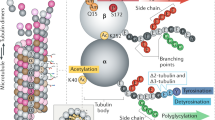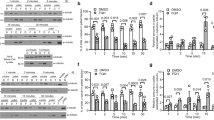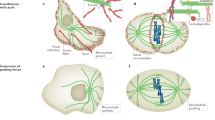Abstract
SEVERAL different classes of mitogens have been discovered1. Stimulation of lymphocytes by all classes of mitogens results in cellular division, but it is not known whether all mitogens act on the cell membrane in identical fashion or result in triggering of the same cytoplasmic messenger. We have investigated the inhibitory effect of microtubule disrupting drugs on lymphocytes transformed by two methods. We report here that colchicine and vinblastine inhibit lectinmediated mitogenesis at low concentrations, while cells stimulated by cell surface oxidation are inhibited only by much higher concentrations of these drugs. It seems that intact microtubules are necessary for lectin-mediated but not for cell surface oxidation-mediated mitogenesis.
This is a preview of subscription content, access via your institution
Access options
Subscribe to this journal
Receive 51 print issues and online access
$199.00 per year
only $3.90 per issue
Buy this article
- Purchase on Springer Link
- Instant access to full article PDF
Prices may be subject to local taxes which are calculated during checkout
Similar content being viewed by others
References
O'Brien, R. L. & Parker, J. W. Cell 7, 13–20 (1976).
Yahara, I. & Edelman, G. M. Expl Cell. Res. 91, 125–142 (1975).
Edelman, G. M., Yahara, I. & Wang, J. L. Proc. natn. Acad. Sci. U.S.A. 70, 1442–1446 (1973).
Medrano, E., Piras, R. & Mordoh, J. Expl Cell Res. 86, 295–300 (1974).
Wang, J. L., Gunther, G. R. & Edelman, G. M. J. Cell Biol. 66, 128–144 (1975).
Novogrodsky, A. & Katchalski, E. Proc. natn. Acad. Sci. U.S.A. 70, 1824–1827 (1973).
Novogrodsky, A. Eur. J. Immun. 48, 646–648 (1974).
Boyum, A. Scand. J. clin. Lab. Invest. 21, Suppl. 97, 77–88 (1968).
Rotman, B. & Papermaster, B. W. Proc. natn. Acad. Sci. U.S.A. 55, 134–141 (1965).
Chu, M. Y. Biochem. Pharmac. 20, 2057–2063 (1971).
Baker, M. E. Nature 262, 785–786 (1976).
Betel, I. & Martijnse, J. Nature 261, 318–319 (1976).
Resch, K., Bouillon, D., Gemsa, D. & Averdunk, R. Nature 265, 349–351 (1977).
Schellenberg, R. R. & Gillespie, E. Nature 265, 741–742 (1977).
Wilson, L. Ann. N. Y. Acad. Sci. 253, 213–230 (1975).
Anderson, J., Edelman, G. M., Moller, G. & Sjoberg, O. Eur. J. Immun. 2, 233–235 (1972).
Greaves, M. & Janossy, G. Transplant. Rev. 11, 87–130 (1972).
Author information
Authors and Affiliations
Rights and permissions
About this article
Cite this article
RASMUSSEN, S., DAVIS, R. Effect of microtubular antagonists on lymphocyte mitogenesis. Nature 269, 249–251 (1977). https://doi.org/10.1038/269249a0
Received:
Accepted:
Issue Date:
DOI: https://doi.org/10.1038/269249a0
Comments
By submitting a comment you agree to abide by our Terms and Community Guidelines. If you find something abusive or that does not comply with our terms or guidelines please flag it as inappropriate.



